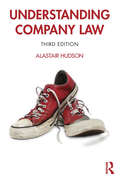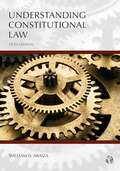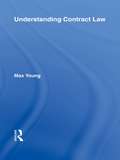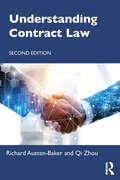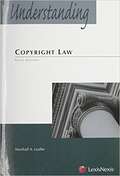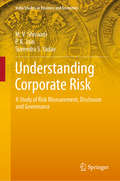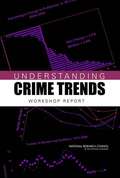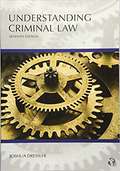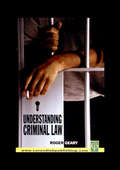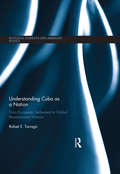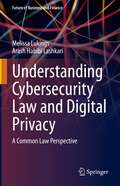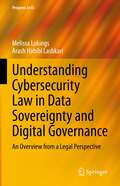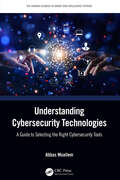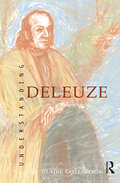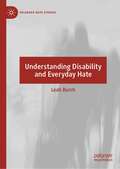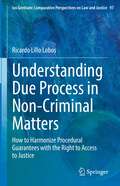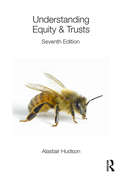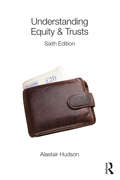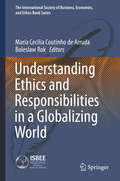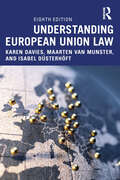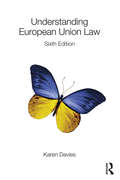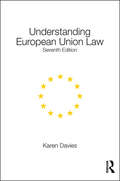- Table View
- List View
Understanding Company Law
by Alastair HudsonUnderstanding Company Law is a lively introduction to modern company law. It takes a unique approach to the subject, which also encompasses the important and growing fields of securities regulation, corporate governance and corporate social responsibility.This textbook covers all of the key topics that a student reader will encounter in any company law course. The discussion presents the key principles simply, before guiding the reader through the more complex issues that are often the focus of examinations in this subject. It also offers pathways into further reading, while injecting enjoyment back into the topic.Understanding Company Law provides a straightforward guide to the law, which is supported by context, detailed analyses of the leading cases, and humour. The third edition has been updated with key recent changes and developments in company law, both case law and statutory, including: the Economic Crime and Corporate Transparency Act 2023, the UK Corporate Governance Code 2024, the Financial Services and Markets Act 2023 and discussion of recent corporate scandals and case law. It will be essential reading for all courses on company law.
Understanding Constitutional Law (Understanding Series)
by William D. AraizaUnderstanding Constitutional Law is a succinct but comprehensive treatment of constitutional law topics typically encountered in a first-year constitutional law class. The book provides the current black letter law doctrines alongside the historical background needed to understand them and the major lines of dissenting thought. It explains the methodological approaches the Court has taken to the topics it covers and is interspersed with commentary to help readers understand both those approaches and the rules they generate. Thus, the book is ideal for both students beginning their education in constitutional law and those seeking a deeper understanding. It's also suitable for practitioners seeking a sourcebook to help them analyze the constitutional law issues confronting them.
Understanding Contract Law
by Max YoungUnderstanding Contract Law offers a clear introduction to the basic concepts of contract law in England. Built around familiar real-world examples that illustrate the concepts, principles and key cases upon which English contract law is structured, Understanding Contract Law is an ideal guide for those approaching an undergraduate law degree, or for general readers interested in this fundamental area of the law. This concise, student-friendly overview, supported by chapter introductions and summaries throughout, covers the fundamental topics in English contract law, including: Agreement and Offer Acceptance Certainty Consideration Privity Misrepresentation.
Understanding Contract Law
by Qi Zhou Richard Austen-BakerUnderstanding Contract Law provides an accessible, in-depth analysis of the purpose of contracting and the role of the law of contract, as well as theories that inform it. Assessing the historical development of this cornerstone of law, the book provides detailed analysis of some of the leading theoretical explanations, and how they are applied in jurisdictions throughout the world. With a new chapter examining the impact of globalization on contract law, this new edition also includes recent behavioural research around responses to contract breach. The book’s accessibility is enhanced by text boxes defining key concepts and terms, and biographical notes of leading figures and scholars. This ensures that readers are able to gain a clear understanding of the narratives and theories explained in the book, and to appreciate how contract law has evolved. Uniquely, the book is not limited to one jurisdiction, making this an essential text for students wishing to expand their knowledge of this fundamental area of law around the world.
Understanding Copyright Law
by Marshall A. LeafferThis new edition of Understanding Copyright Law has incorporated all the recent case law and legislative developments, focusing on the challenges of the digital age. Written with clarity and precision, this edition of Understanding Copyright Law remains the most accessible and comprehensive text for students of copyright law.
Understanding Corporate Risk: A Study of Risk Measurement, Disclosure and Governance (India Studies in Business and Economics)
by Surendra S. Yadav M. V. Shivaani P. K. JainThis book proposes three normative frameworks pertaining to risk-measurement, disclosure and governance using expert opinion and data from the top 429 non-financial companies (of the NIFTY 500 index) over a 10-year period. The book offers a novel contribution to the global literature on disclosure quality by presenting a composite measure of the quality as well as quantity of risk disclosures. Focusing on the quality of risk disclosures and risk governance structures, and using sophisticated methodology to tackle the issue of endogeneity, the book explores the important yet uncharted confluence of accounting information, risk and corporate governance. It addresses the interplay between three facets of risk, and is corroborated by practitioners’ perspectives as well as case studies. It is an excellent resource for practitioners, professionals and policy-makers, in addition to researchers working on the topic.
Understanding Crime Trends: Workshop Report
by National Research Council of the National AcademiesChanges over time in the levels and patterns of crime have significant consequences that affect not only the criminal justice system but also other critical policy sectors. Yet compared with such areas as health status, housing, and employment, the nation lacks timely information and comprehensive research on crime trends. Descriptive information and explanatory research on crime trends across the nation that are not only accurate, but also timely, are pressing needs in the nation's crime-control efforts. In April 2007, the National Research Council held a two-day workshop to address key substantive and methodological issues underlying the study of crime trends and to lay the groundwork for a proposed multiyear NRC panel study of these issues. Six papers were commissioned from leading researchers and discussed at the workshop by experts in sociology, criminology, law, economics, and statistics. The authors revised their papers based on the discussants' comments, and the papers were then reviewed again externally. The six final workshop papers are the basis of this volume, which represents some of the most serious thinking and research on crime trends currently available.
Understanding Criminal Law
by Joshua DresslerThis text is primarily designed for use by law students enrolled in a course in Criminal Law. It also has served successfully in undergraduate courses covering substantive criminal law. The text considers common law doctrine, statutory reform (with particular emphasis on the Model Penal Code), and constitutional law affecting the substantive criminal law.
Understanding Criminal Law
by Rodger GearyUnderstanding Criminal Law clarifies a subject which students often find somewhat difficult and confusing. This difficulty stems partly from the rapid changes which criminal law undergoes, through frequent statutory amendments and judicial decisions, but more importantly from the sheer complexity of the subject matter. This book provides a clear and concise text for those studying traditional black-letter substantive criminal law. The author takes a logical and straightforward approach, specifically designed to enable the reader to quickly master the basic principles and ensure examination success. Emphasis is given to major case law, relevant statutory provisions and writings of academic commentators. In selected areas the book evaluates the law and suggests possible reforms; this evaluative aspect is intended to stimulate the reader to think more critically about the subject without engendering confusion about basic principles. Although designed primarily for full-time undergraduate LLB students, the book should also prove useful for those studying criminal law on part-time courses, as well as those on Diploma in Law courses, and students of A and AS Level Law. It is also ideal for the study of criminal law on modular courses and joint degrees.
Understanding Criminal Law 3rd edition
by Joshua DressierThis book explains all of the basic concepts of criminal law in a clear, intelligent manner.
Understanding Cuba as a Nation: From European Settlement to Global Revolutionary Mission (Routledge Studies in Latin American Politics)
by Rafael E. TarragóSince 1959, the government of the Caribbean island of Cuba, 90 miles away from the United States of America, has defied its powerful neighbor. The story of the improbable survival of the Cuban Revolutionary Government in its struggle against the most powerful country in the world has kept international attention on Cuba for more than half a century; but it has also overshadowed the brilliance of the hybrid culture developed in the island since the Spanish conquerors brought Western civilization to the Americas 500 years ago. Rafael E. Tarragó pays due attention to the first four hundred years after the arrival of the Spaniards in the island, showing that a Cuban nation had developed from the European and African settlers with the indigenous population before the creation of the Cuban Republic in 1902. He describes the accomplishments and failures of that Republic that made possible the rise of the Cuban Revolutionary Government. He concludes with a look at accomplishments and the shortcomings of that self-proclaimed Marxist-Leninist government; its troubled relation with the United States; and the global revolutionary mission that it has embraced since its inception. Understanding Cuba as a Nation is a detailed yet accessibly written exploration of the history of Cuba since the Spanish conquest of 1511 that illustrates the development of the Cuban nation, and summarizes the accomplishments of Cubans since the 16th century in the arts, literature, and science.
Understanding Cybersecurity Law and Digital Privacy: A Common Law Perspective (Future of Business and Finance)
by Arash Habibi Lashkari Melissa LukingsCybersecurity, data privacy law, and the related legal implications overlap into a relevant and developing area in the legal field. However, many legal practitioners lack the foundational understanding of computer processes which are fundamental for applying existing and developing legal structures to the issue of cybersecurity and data privacy. At the same time, those who work and research in cybersecurity are often unprepared and unaware of the nuances of legal application. This book translates the fundamental building blocks of data privacy and (cyber)security law into basic knowledge that is equally accessible and educational for those working and researching in either field, those who are involved with businesses and organizations, and the general public.
Understanding Cybersecurity Law in Data Sovereignty and Digital Governance: An Overview from a Legal Perspective (Progress in IS)
by Arash Habibi Lashkari Melissa LukingsThis book provides an overview of the topics of data, sovereignty, and governance with respect to data and online activities through a legal lens and from a cybersecurity perspective. This first chapter explores the concepts of data, ownerships, and privacy with respect to digital media and content, before defining the intersection of sovereignty in law with application to data and digital media content. The authors delve into the issue of digital governance, as well as theories and systems of governance on a state level, national level, and corporate/organizational level. Chapter three jumps into the complex area of jurisdictional conflict of laws and the related issues regarding digital activities in international law, both public and private. Additionally, the book discusses the many technical complexities which underlay the evolution and creation of new law and governance strategies and structures. This includes socio-political, legal, and industrial technical complexities which can apply in these areas. The fifth chapter is a comparative examination of the legal strategies currently being explored by a variety of nations. The book concludes with a discussion about emerging topics which either influence, or are influenced by, data sovereignty and digital governance, such as indigenous data sovereignty, digital human rights and self-determination, artificial intelligence, and global digital social responsibility. Cumulatively, this book provides the full spectrum of information, from foundational principles underlining the described topics, through to the larger, more complex, evolving issues which we can foresee ahead of us.
Understanding Cybersecurity Technologies: A Guide to Selecting the Right Cybersecurity Tools (The Human Element in Smart and Intelligent Systems)
by Abbas MoallemCyberattacks on enterprises, government institutions, and individuals are exponentially growing. At the same time, the number of companies, both small and large, offering all types of solutions has been increasing too. Since companies rely on technological solutions to protect themselves against cyberattacks, understanding and selecting the right solutions among those offered presents a significant challenge for professionals, company executives, and newcomers to the cybersecurity field.FEATURES Presents descriptions for each type of cybersecurity technology and their specifications Explains applications, usages, and offers case studies to enhance comprehension Offers an easy-to-understand classification of existing cybersecurity technologies Provides an understanding of the technologies without getting lost in technical details Focuses on existing technologies used in different solutions, without focusing on the companies that offer these technologies This book is intended to help all professionals new to cybersecurity, students, and experts to learn or educate their audiences on the foundations of the available solutions.
Understanding Deleuze
by Claire Colebrook'The best introduction to Deleuze, and to the collective writings of Deleuze and Guattari, available yet! Claire Colebrook has produced a truly accessible pathway into the labyrinthine enchantments offered for contemporary thought by Deleuzianism, making concepts clear, showing their political and theoretical complexity, elaborating their social and artistic relevance. A wonderful, lucid opening onto the new worlds of Deleuze.'Elizabeth Grosz, Rutgers University'A wonderfully clear introduction to key Deleuzian concepts and to their effectiveness in fields ranging from ethics and politics to cinema, literary and cultural studies. Claire Colebrook provides a series of effortless transitions from Deleuze's philosophical concerns (eg: difference, representation, desire and affect) to concrete problems in a variety of fields. This book is an excellent guide to an important body of critical thought.'Paul Patton, Professor of Philosophy, University of NSWA genuine attempt to think differently, Gilles Deleuze's work challenges, provokes and frustrates. Surprisingly practical as well as innovative, it is now being seen as a 'must read' for students and scholars across the humanities and social sciences. Claire Colebrook's Understanding Deleuze offers a comprehensive and very accessible introduction to his work. hink differently. It is built on the notion of an immanent ethics: how can we have a political and ethical theory without some external foundation such as the subject or morality? He argues that the only way we can do this is with a theory of the virtual, and he sees all life (not just cyberculture) as virtual. Deleuze goes further than Foucault or Derrida in questioning the boundaries of the subject and knowledge. For Deleuze perception extends beyond the human, to animals, machines and microorganisms.Deleuze's writing is challenging and hard to read, and so far there is no introduction to his work. Claire Colebrook's primer offers an accessible introduction to the whole Deleuzian oeuvre, including the work he did with Guattari.
Understanding Disability Law (Second Edition)
by Mark C. WeberThis book discusses the major statutory and constitutional issues relating to disability discrimination. It is designed to help students in Disability Law courses synthesize and apply the materials they are learning.
Understanding Disability and Everyday Hate (Palgrave Hate Studies)
by Leah BurchThis book examines disability hate crime. It focusses on key questions concerning the ways in which hate is understood and experienced within the context of the everyday, in addition to the unique ways that hate can hurt and be resisted. It introduces readers to questions surrounding the conceptual framework of hate and policy context in England and Wales, and extends these discussions to center upon the experiences of disabled people. It presents a conceptual reconsideration of hate crime that connects hate, disability and everyday lives and spaces using an affective (embodied and emotional) understanding of these experiences. Drawing on empirical data, this framework helps to attend to the diverse ways that disabled people negotiate, respond to, and resist hate within the context of their everyday lives. The book argues that the affective capacity of disabled people can be enhanced through their reflections upon hateful experiences and general experiences of navigating a disabling social world. By working with the concept of ‘affective possibility’, this book offers a more affirmative approach to harnessing the everyday forms of resistance already present within disabled people’s lives. It speaks to academics, students, and practitioners interested in disability, affect studies, hate crime studies, sociology, and criminology.
Understanding Due Process in Non-Criminal Matters: How to Harmonize Procedural Guarantees with the Right to Access to Justice (Ius Gentium: Comparative Perspectives on Law and Justice #97)
by Ricardo Lillo LobosHow we understand what procedure is due as a fundamental or constitutional right can have a critical impact on designing a civil procedure. Drawing on comparative law and empirically oriented methodologies, in this book the author provides a thorough analysis of how procedural due process is understood both in national jurisdictions and in the field of international human rights law.The book offers a suitable due process theory for civil matters in general, assessing the different roles that this basic international human right plays in comparison with criminal justice. In this regard, it argues that the civil justice conception of due process has grown under the shadow of criminal justice for too long. Moreover, the theory answers the question of what the basic requirements are concerning the right to a fair trial on civil matters, i.e., the question of what we can and cannot sacrifice when designing a civil procedure that correctly distributes the risk of moral harm while remaining accessible to people with complex and simple legal needs, in order to reconcile the requirements of procedural fairness with social demands for justice.This book makes a valuable contribution to the field of civil justice, legal design, and access to justice by providing an empirically based normative theory regarding the right to a fair trial. As such, it will be of interest to a broad audience: policymakers, practitioners and judges, but also researchers and scholars interested in theoretical questions in jurisprudence, and those familiar with empirical legal studies, comparative law, and other socio-legal studies.
Understanding Employment Discrimination
by Thomas R. HaggardEmployment discrimination law is like a huge jigsaw puzzle— albeit one with many missing and mismatched pieces, which are constantly being changed. The purpose of Understanding Employment Discrimination Law is to clarify the differences, uncertainty, and complexity of employment discrimination law.
Understanding Equity & Trusts
by Alastair HudsonThe 7th edition of Understanding Equity &Trusts provides a clear, accessible and lively overview of the main themes in this dynamic area of the law. An ideal first point of entry to the subject or revision tool, this book will give you an invaluable grounding in all of the key principles of equity and the law of trusts. If you need help with trusts law, then this is the book for you. This book covers all of the topics that a student reader will encounter in any trusts law or equity course. The text deals with express trusts, resulting and constructive trusts, the duties of trustees, breach of trust and tracing, commercial uses of trusts, charities, equitable remedies and trusts of homes. The law of trusts is built on simple basic principles. The approach of this book is to lay foundations with an explanation of those principles before building towards the more complex issues which are the focus of examinations in this subject. The lively text includes a large number of straightforward examples to make the discussion of the general law more accessible.
Understanding Equity & Trusts
by Alastair HudsonUnderstanding Equity & Trusts provides a clear, accessible and lively overview of the main themes in this dynamic area of the law. An ideal first point of entry to the subject or revision tool, this book will give you an invaluable grounding in all of the key principles of equity and the law of trusts. If you need help with trusts law, then this is the book for you. This book covers all of the topics that a student reader will encounter in any trusts law or equity course. The text deals with express trusts, resulting and constructive trusts, the duties of trustees, breach of trust and tracing, commercial uses of trusts, charities, equitable remedies and trusts of homes. The law of trusts is built on simple basic principles. The approach of this book is to lay foundations with an explanation of those principles before building towards the more complex issues which are the focus of examinations in this subject. The lively text includes a large number of straightforward examples to make the discussion of the general law more accessible.
Understanding Ethics and Responsibilities in a Globalizing World
by Maria Cecilia Coutinho de Arruda Boleslaw RokThis book contemplates the ethics of responsibility in a large range of meanings, consequences and impacts. It reflects the perspectives and reasoning of 24 authors from all continents. All chapters are original papers presented at the Fifth World ISBEE Congress, that took place in Warsaw, Poland, at the Kozminski University, on 11-14 of July, 2012. In this book, ethics and responsibility are considered essential traits of character, not only in the business or governmental arenas but in any initiative, decision and activity. The contributions to this book focus on a spectrum of themes, terms and concepts, the global corporate social responsibilities perspective covering impacts, challenges, analysis, criticism, consequences of important topics of real life, sustainability, international economy and regimes, corruption, poverty and violence, among others. The book is intended for academics, researchers and professionals in all continents who are dedicated to Ethics, Business Ethics, Corporate Social Responsibility, Social Innovation, and Sustainability Management.
Understanding European Union Law
by Karen Davies Maarten van Munster Isabel DüsterhöftProviding short, clear and accessible explanations of the main areas of EU law, Understanding European Union Law is both an ideal introduction for students new to EU law and an essential addition to revision for the more accomplished. This eighth edition has been fully revised and updated with the latest legislative changes and includes an in-depth discussion of ‘Brexit’ and its implications for EU–UK relations. The book provides readers with a clear understanding of the structures and rationale behind EU law, explaining how and why the law has developed as it has. In addition to discussing the core areas of EU law such as its sources, the role and powers of the EU’s Institutions, the enforcement of EU law and the law of the internal market, this edition also includes a new chapter on three ‘non-economic’ areas of EU law: fundamental human rights, equality (non-discrimination) and the environment. This student-friendly text is both broad in scope and highly accessible. It will inspire students towards further study and show that understanding EU law can be an enjoyable and rewarding experience. As well as being essential reading for Law students, Understanding European Union Law is also suitable for students on other courses where basic knowledge of EU law is required or useful, such as business studies, political science, international relations or European studies programmes.
Understanding European Union Law
by Karen DaviesUnderstanding European Union Law is both an ideal introduction for students new to EU law and an essential addition to revision for the more accomplished. It is also indispensable reading for students on business studies courses. Fully revised and updated, this sixth edition continues to look at the main themes of EU law in a straightforward and logical manner. Updated to discuss the UK’s increasingly difficult relationship with the EU and recent developments in EU citizenship rights such as the Zambrano decision, this book provides the reader with a clear understanding of EU law, concentrating on how and why the law has developed as it has. A chapter on assessment guidance has been expanded to provide advice on revision, coursework and examinations on the subject of EU law. This student-friendly text is broad in scope and highly accessible, inspiring students toward further study and showing that understanding EU law can be an enjoyable and rewarding experience.
Understanding European Union Law
by Karen DaviesUnderstanding European Union Law is both an ideal introduction for students new to EU law and an essential addition to revision for the more accomplished. It is also indispensable reading for students on business studies courses. Fully revised and updated, this seventh edition continues to look at the main themes of EU law in a straightforward and logical manner. Updated to discuss the results of the 2016 EU Referedum and the possible impacts of 'Brexit', this book provides the reader with a clear understanding of EU law, concentrating on how and why the law has developed as it has. The section on competition law has also been expanded. This student-friendly text is broad in scope and highly accessible, inspiring students towards further study and showing that understanding EU law can be an enjoyable and rewarding experience.
